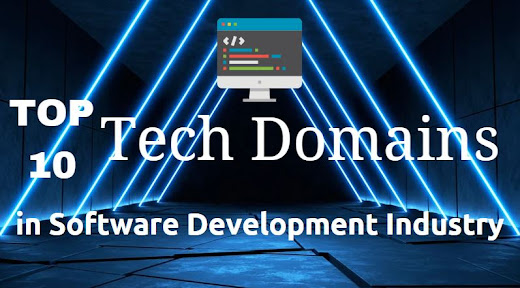Top 10 Tech Domains in Software Development Industry
Top 10 Tech Domains in Software
Development Industry
In the fast-paced and constantly evolving world of software development, staying on top of the latest tech domains is crucial to remain competitive and relevant. From web development to artificial intelligence, the software development industry offers a vast array of tech domains that can be overwhelming to navigate. In this article, we will break down the top 10 tech domains in the software development industry, providing you with a comprehensive overview of each domain and how they fit into the larger software development landscape. By the end of this article, you will have a clear understanding of the most critical tech domains to focus on to stay ahead of the curve in software development.
So, let's dive and explore these tech domains.
1. Web Development:
This involves building websites and web applications using programming languages such as HTML, CSS, and JavaScript. To get started, you can learn the basics of web development by enrolling in online courses or tutorials, and practice building websites and web applications using popular web development frameworks like React, Angular, or Vue.
2. App Development:
This involves building mobile apps for Android or iOS platforms. To get started, you can learn the fundamentals of mobile development using tools like Android Studio or Xcode, and build simple mobile apps using languages like Java or Swift.
3. Cloud Computing:
This involves delivering computing services over the internet, including storage, processing power, and software applications. To get started, you can learn the basics of cloud computing platforms like Amazon Web Services (AWS) or Microsoft Azure, and develop skills in cloud computing architecture, deployment, and management.
4. Artificial Intelligence:
This involves building intelligent systems that can learn from data, recognize patterns, and make decisions. To get started, you can learn the fundamentals of AI and machine learning by taking online courses or reading books, and practicing building machine learning models using popular libraries like TensorFlow or PyTorch.
5. Cybersecurity:
This involves protecting computer systems and networks from unauthorized access, theft, or damage. To get started, you can learn the basics of cybersecurity principles and practices, and develop skills in threat analysis, risk management, and security operations using resources like the National Institute of Standards and Technology (NIST) Cybersecurity Framework.
6. DevOps:
This involves streamlining software development and deployment processes using automation, collaboration, and monitoring tools. To get started, you can learn the basics of DevOps principles and practices, and develop skills in continuous integration and deployment using popular tools like Jenkins or Travis CI.
7. Data Science:
This involves extracting insights and knowledge from large volumes of data using statistical and computational methods. To get started, you can learn the fundamentals of data science by taking online courses or reading books, and practice building data models and visualizations using popular programming languages like Python or R.
8. Game Development:
Game development is the process of creating video games, which involves designing, and programming the game mechanics, creating game assets such as characters and environments, and integrating them into a functional game. It requires a diverse set of skills, including proficiency in programming languages such as C++, C#, or Java, knowledge of game engines such as Unity or Unreal Engine, graphic design and 3D modeling, animation, and sound design.
9. Blockchain:
This involves building decentralized systems that can securely record and store transactions using distributed ledgers. To get started, you can learn the fundamentals of blockchain technology by taking online courses or reading books, and practice building decentralized applications using popular platforms like Ethereum or Hyperledger.
10. Virtual and Augmented Reality:
This involves creating immersive experiences using virtual and augmented reality technologies. To get started, you can learn the basics of VR and AR development by taking online courses or reading books, and practicing building VR/AR applications using popular tools like Unity or Unreal Engine.

Comments
Post a Comment